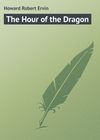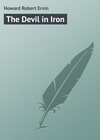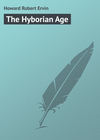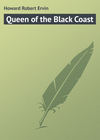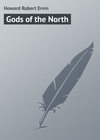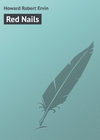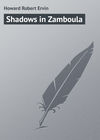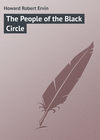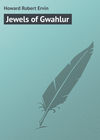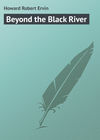Buch lesen: «The Hour of the Dragon», Seite 8
11
Swords of the South
Dawn that rose over the distant hills shone on the sails of a small craft that dropped down the river which curves to within a mile of the walls of Tarantia, and loops southward like a great shining serpent. This boat differed from the ordinary craft plying the broad Khorotas – fishermen and merchant barges loaded with rich goods. It was long and slender, with a high, curving prow, and was black as ebony, with white skulls painted along the gunwales. Amidships rose a small cabin, the windows closely masked. Other craft gave the ominously painted boat a wide berth; for it was obviously one of those 'pilgrim boats' that carried a lifeless follower of Asura on his last mysterious pilgrimage southward to where, far beyond the Poitanian mountains, a river flowed at last into the blue ocean. In that cabin undoubtedly lay the corpse of the departed worshipper. All men were familiar with the sight of those gloomy craft; and the most fanatical votary of Mitra would not dare touch or interfere with their somber voyages.
Where the ultimate destination lay, men did not know. Some said Stygia; some a nameless island lying beyond the horizon; others said it was in the glamorous and mysterious land of Vendhya where the dead came home at last. But none knew certainly. They only knew that when a follower of Asura died, the corpse went southward down the great river, in a black boat rowed by a giant slave, and neither boat nor corpse nor slave was ever seen again; unless, indeed, certain dark tales were true, and it was always the same slave who rowed the boats southward.
The man who propelled this particular boat was as huge and brown as the others, though closer scrutiny might have revealed the fact that the hue was the result of carefully applied pigments. He was clad in leather loin-cloth and sandals, and he handled the long sweep and oars with unusual skill and power. But none approached the grim boat closely, for it was well known that the followers of Asura were accursed, and that these pilgrim boats were loaded with dark magic. So men swung their boats wide and muttered an incantation as the dark craft slid past, and they never dreamed that they were thus assisting in the flight of their king and the Countess Albiona.
It was a strange journey, in that black, slim craft down the great river for nearly two hundred miles to where the Khorotas swings eastward, skirting the Poitanian mountains. Like a dream the ever-changing panorama glided past. During the day Albiona lay patiently in the little cabin, as quietly as the corpse she pretended to be. Only late at night, after the pleasure boats with their fair occupants lounging on silken cushions in the flare of torches held by slaves had left the river, before dawn brought the hurrying fisherboats, did the girl venture out. Then she held the long sweep, cunningly bound in place by ropes to aid her, while Conan snatched a few hours of sleep. But the king needed little rest. The fire of his desire drove him relentlessly; and his powerful frame was equal to the grinding test. Without halt or pause they drove southward.
So down the river they fled, through nights when the flowing current mirrored the million stars, and through days of golden sunlight, leaving winter behind them as they sped southward. They passed cities in the night, above which throbbed and pulsed the reflection of the myriad lights, lordly river villas and fertile groves. So at last the blue mountains of Poitain rose above them, tier above tier, like ramparts of the gods, and the great river, swerving from those turreted cliffs, swept thunderously through the marching hills with many a rapid and foaming cataract.
Conan scanned the shoreline closely, and finally swung the long sweep and headed inshore at a point where a neck of land jutted into the water, and fir trees grew in a curiously symmetrical ring about a gray, strangely shaped rock.
'How these boats ride those falls we hear roaring ahead of us is more than I can see,' he grunted. 'Hadrathus said they did – but here's where we halt. He said a man would be waiting for us with horses, but I don't see anyone. How word of our coming could have preceded us I don't know anyway.'
He drove inshore and bound the prow to an arching root in the low bank, and then, plunging into the water, washed the brown paint from his skin and emerged dripping, and in his natural color. From the cabin he brought forth a suit of Aquilonian ring-mail which Hadrathus had procured for him, and his sword. These he donned while Albiona put on garments suitable for mountain travel. And when Conan was fully armed, and turned to look toward the shore, he started and his hand went to his sword. For on the shore, under the trees, stood a black-cloaked figure holding the reins of a white palfrey and a bay war-horse.
'Who are you?' demanded the king.
The other bowed low.
'A follower of Asura. A command came. I obeyed.'
'How, "came"?' inquired Conan, but the other merely bowed again.
'I have come to guide you through the mountains to the first Poitanian stronghold.'
'I don't need a guide,' answered Conan. 'I know these hills well. I thank you for the horses, but the countess and I will attract less attention alone than if we were accompanied by an acolyte of Asura.'
The man bowed profoundly, and giving the reins into Conan's hands, stepped into the boat. Casting off, he floated down the swift current, toward the distant roar of the unseen rapids. With a baffled shake of his head, Conan lifted the countess into the palfrey's saddle, and then mounted the war-horse and reined toward the summits that castellated the sky.
The rolling country at the foot of the towering mountains was now a borderland, in a state of turmoil, where the barons reverted to feudal practises, and bands of outlaws roamed unhindered. Poitain had not formally declared her separation from Aquilonia, but she was now, to all intents, a self-contained kingdom, ruled by her hereditary count, Trocero. The rolling south country had submitted nominally to Valerius, but he had not attempted to force the passes guarded by strongholds where the crimson leopard banner of Poitain waved defiantly.
The king and his fair companion rode up the long blue slopes in the soft evening. As they mounted higher, the rolling country spread out like a vast purple mantle far beneath them, shot with the shine of rivers and lakes, the yellow glint of broad fields, and the white gleam of distant towers. Ahead of them and far above, they glimpsed the first of the Poitanian holds – a strong fortress dominating a narrow pass, the crimson banner streaming against the clear blue sky.
Before they reached it, a band of knights in burnished armor rode from among the trees, and their leader sternly ordered the travelers to halt. They were tall men, with the dark eyes and raven locks of the south.
'Halt, sir, and state your business, and why you ride toward Poitain.'
'Is Poitain in revolt then,' asked Conan, watching the other closely, 'that a man in Aquilonian harness is halted and questioned like a foreigner?'
'Many rogues ride out of Aquilonia these days,' answered the other coldly. 'As for revolt, if you mean the repudiation of a usurper, then Poitain is in revolt. We had rather serve the memory of a dead man than the scepter of a living dog.'
Conan swept off his helmet, and shaking back his black mane, stared full at the speaker. The Poitanian stared violently and went livid.
'Saints of heaven!' he gasped. 'It is the king – alive!'
The others stared wildly, then a roar of wonder and joy burst from them. They swarmed about Conan, shouting their war-cries and brandishing their swords in their extreme emotion. The acclaim of Poitanian warriors was a thing to terrify a timid man.
'Oh, but Trocero will weep tears of joy to see you, sire!' cried one.
'Aye, and Prospero!' shouted another. 'The general has been like one wrapped in a mantle of melancholy, and curses himself night and day that he did not reach the Valkia in time to die beside his king!'
'Now we will strike for empery!' yelled another, whirling his great sword about his head. 'Hail, Conan, king of Poitain!'
The clangor of bright steel about him and the thunder of their acclaim frightened the birds that rose in gay-hued clouds from the surrounding trees. The hot southern blood was afire, and they desired nothing but for their new-found sovereign to lead them to battle and pillage.
'What is your command, sire?' they cried. 'Let one of us ride ahead and bear the news of your coming into Poitain! Banners will wave from every tower, roses will carpet the road before your horse's feet, and all the beauty and chivalry of the south will give you the honor due you – '
Conan shook his head.
'Who could doubt your loyalty? But winds blow over these mountains into the countries of my enemies, and I would rather these didn't know that I lived – yet. Take me to Trocero, and keep my identity a secret.'
So what the knights would have made a triumphal procession was more in the nature of a secret flight. They traveled in haste, speaking to no one, except for a whisper to the captain on duty at each pass; and Conan rode among them with his vizor lowered.
The mountains were uninhabited save by outlaws and garrisons of soldiers who guarded the passes. The pleasure-loving Poitanians had no need nor desire to wrest a hard and scanty living from their stern breasts. South of the ranges the rich and beautiful plains of Poitain stretched to the river Alimane; but beyond the river lay the land of Zingara.
Even now, when winter was crisping the leaves beyond the mountains, the tall rich grass waved upon the plains where grazed the horses and cattle for which Poitain was famed. Palm trees and orange groves smiled in the sun, and the gorgeous purple and gold and crimson towers of castles and cities reflected the golden light. It was a land of warmth and plenty, of beautiful men and ferocious warriors. It is not only the hard lands that breed hard men. Poitain was surrounded by covetous neighbors and her sons learned hardihood in incessant wars. To the north the land was guarded by the mountains, but to the south only the Alimane separated the plains of Poitain from the plains of Zingara, and not once but a thousand times had that river run red. To the east lay Argos and beyond that Ophir, proud kingdoms and avaricious. The knights of Poitain held their lands by the weight and edge of their swords, and little of ease and idleness they knew.
So Conan came presently to the castle of Count Trocero…
Conan sat on a silken divan in a rich chamber whose filmy curtains the warm breeze billowed. Trocero paced the floor like a panther, a lithe, restless man with the waist of a woman and the shoulders of a swordsman, who carried his years lightly.
'Let us proclaim you king of Poitain!' urged the count. 'Let those northern pigs wear the yoke to which they have bent their necks. The south is still yours. Dwell here and rule us, amid the flowers and the palms.'
But Conan shook his head. 'There is no nobler land on earth than Poitain. But it cannot stand alone, bold as are its sons.'
'It did stand alone for generations,' retorted Trocero, with the quick jealous pride of his breed. 'We were not always a part of Aquilonia.'
'I know. But conditions are not as they were then, when all kingdoms were broken into principalities which warred with each other. The days of dukedoms and free cities are past, the days of empires are upon us. Rulers are dreaming imperial dreams, and only in unity is there strength.'
'Then let us unite Zingara with Poitain,' argued Trocero. 'Half a dozen princes strive against each other, and the country is torn asunder by civil wars. We will conquer it, province by province, and add it to your dominions. Then with the aid of the Zingarans we will conquer Argos and Ophir. We will build an empire – '
Again Conan shook his head. 'Let others dream imperial dreams. I but wish to hold what is mine. I have no desire to rule an empire welded together by blood and fire. It's one thing to seize a throne with the aid of its subjects and rule them with their consent. It's another to subjugate a foreign realm and rule it by fear. I don't wish to be another Valerius. No, Trocero, I'll rule all Aquilonia and no more, or I'll rule nothing.'
'Then lead us over the mountains and we will smite the Nemedians.'
Conan's fierce eyes glowed with appreciation.
'No, Trocero. It would be a vain sacrifice. I've told you what I must do to regain my kingdom. I must find the Heart of Ahriman.'
'But this is madness!' protested Trocero, 'The maunderings of a heretical priest, the mumblings of a mad witch-woman.'
'You were not in my tent before Valkia,' answered Conan grimly, involuntarily glancing at his right wrist, on which blue marks still showed faintly. 'You didn't see the cliffs thunder down to crush the flower of my army. No, Trocero, I've been convinced. Xaltotun's no mortal man, and only with the Heart of Ahriman can I stand against him. So I'm riding to Kordava, alone.'
'But that is dangerous,' protested Trocero.
'Life is dangerous,' rumbled the king. 'I won't go as king of Aquilonia, or even as a knight of Poitain, but as a wandering mercenary, as I rode in Zingara in the old days. Oh, I have enemies enough south of the Alimane, in the lands and the waters of the south. Many who won't know me as king of Aquilonia will remember me as Conan of the Barachan pirates, or Amra of the black corsairs. But I have friends, too, and men who'll aid me for their own private reasons.' A faintly reminiscent grin touched his lips.
Trocero dropped his hands helplessly and glanced at Albiona, who sat on a near-by divan.
'I understand your doubts, my lord,' said she. 'But I too saw the coin in the temple of Asura, and look you, Hadrathus said it was dated five hundred years before the fall of Acheron. If Xaltotun, then, is the man pictured on the coin, as his Majesty swears he is, that means he was no common wizard, even in his other life, for the years of his life were numbered by centuries, not as the lives of other men are numbered.'
Before Trocero could reply, a respectful rap was heard on the door and a voice called: 'My lord, we have caught a man skulking about the castle, who says he wishes to speak with your guest. I await your orders.'
'A spy from Aquilonia!' hissed Trocero, catching at his dagger, but Conan lifted his voice and called: 'Open the door and let me see him.'
The door was opened and a man was framed in it, grasped on either hand by stern-looking men-at-arms. He was a slender man, clad in a dark hooded robe.
'Are you a follower of Asura?' asked Conan.
The man nodded, and the stalwart men-at-arms looked shocked and glanced hesitantly at Trocero.
'The word came southward,' said the man. 'Beyond the Alimane we can not aid you, for our sect goes no farther southward, but stretches eastward with the Khorotas. But this I have learned: the thief who took the Heart of Ahriman from Tarascus never reached Kordava. In the mountains of Poitain he was slain by robbers. The jewel fell into the hands of their chief, who, not knowing its true nature, and being harried after the destruction of his band by Poitanian knights, sold it to the Kothic merchant Zorathus.'
'Ha!' Conan was on his feet, galvanized. 'And what of Zorathus?'
'Four days ago he crossed the Alimane, headed for Argos, with a small band of armed servants.'
'He's a fool to cross Zingara in such times,' said Trocero.
'Aye, times are troublous across the river. But Zorathus is a bold man, and reckless in his way. He is in great haste to reach Messantia, where he hopes to find a buyer for the jewel. Perhaps he hopes to sell it finally in Stygia. Perhaps he guesses at its true nature. At any rate, instead of following the long road that winds along the borders of Poitain and so at last comes into Argos far from Messantia, he has struck straight across eastern Zingara, following the shorter and more direct route.'
Conan smote the table with his clenched fist so that the great board quivered.
'Then, by Crom, fortune has at last thrown the dice for me! A horse, Trocero, and the harness of a Free Companion! Zorathus has a long start, but not too long for me to overtake him, if I follow him to the end of the world!'
12
The Fang of the Dragon
At dawn Conan waded his horse across the shallows of the Alimane and struck the wide caravan trail which ran southeastward, and behind him, on the farther bank, Trocero sat his horse silently at the head of his steel-clad knights, with the crimson leopard of Poitain floating its long folds over him in the morning breeze. Silently they sat, those dark-haired men in shining steel, until the figure of their king had vanished in the blue of distance that whitened toward sunrise.
Conan rode a great black stallion, the gift of Trocero. He no longer wore the armor of Aquilonia. His harness proclaimed him a veteran of the Free Companies, who were of all races. His headpiece was a plain morion, dented and battered. The leather and mail-mesh of his hauberk were worn and shiny as if by many campaigns, and the scarlet cloak flowing carelessly from his mailed shoulders was tattered and stained. He looked the part of the hired fighting-man, who had known all vicissitudes of fortune, plunder and wealth one day, an empty purse and a close-drawn belt the next.
And more than looking the part, he felt the part; the awakening of old memories, the resurge of the wild, mad, glorious days of old before his feet were set on the imperial path when he was a wandering mercenary, roistering, brawling, guzzling, adventuring, with no thought for the morrow, and no desire save sparkling ale, red lips, and a keen sword to swing on all the battlefields of the world.
Unconsciously he reverted to the old ways; a new swagger became evident in his bearing, in the way he sat his horse; half-forgotten oaths rose naturally to his lips, and as he rode he hummed old songs that he had roared in chorus with his reckless companions in many a tavern and on many a dusty road or bloody field.
It was an unquiet land through which he rode. The companies of cavalry which usually patrolled the river, alert for raids out of Poitain, were nowhere in evidence. Internal strife had left the borders unguarded. The long white road stretched bare from horizon to horizon. No laden camel trains or rumbling wagons or lowing herds moved along it now; only occasional groups of horsemen in leather and steel, hawk-faced, hard-eyed men, who kept together and rode warily. These swept Conan with their searching gaze but rode on, for the solitary rider's harness promised no plunder, but only hard strokes.
Villages lay in ashes and deserted, the fields and meadows idle. Only the boldest would ride the roads these days, and the native population had been decimated in the civil wars, and by raids from across the river. In more peaceful times the road was thronged with merchants riding Poitain to Messantia in Argos, or back. But now these found it wiser to follow the road that led east through Poitain, and then turned south down across Argos. It was longer, but safer. Only an extremely reckless man would risk his life and goods on this road through Zingara.
The southern horizon was fringed with flame by night, and in the day straggling pillars of smoke drifted upward; in the cities and plains to the south men were dying, thrones were toppling and castles going up in flames. Conan felt the old tug of the professional fighting-man, to turn his horse and plunge into the fighting, the pillaging and the looting as in the days of old. Why should he toil to regain the rule of a people which had already forgotten him? – why chase a will-o'-the-wisp, why pursue a crown that was lost for ever? Why should he not seek forgetfulness, lose himself in the red tides of war and rapine that had engulfed him so often before? Could he not, indeed, carve out another kingdom for himself? The world was entering an age of iron, an age of war and imperialistic ambition; some strong man might well rise above the ruins of nations as a supreme conqueror. Why should it not be himself? So his familiar devil whispered in his ear, and the phantoms of his lawless and bloody past crowded upon him. But he did not turn aside; he rode onward, following a quest that grew dimmer and dimmer as he advanced, until sometimes it seemed that he pursued a dream that never was.
He pushed the black stallion as hard as he dared, but the long white road lay bare before him, from horizon to horizon. It was a long start Zorathus had, but Conan rode steadily on, knowing that he was traveling faster than the burdened merchants could travel. And so he came to the castle of Count Valbroso, perched like a vulture's eyrie on a bare hill overlooking the road.
Valbroso rode down with his men-at-arms, a lean, dark man with glittering eyes and a predatory beak of a nose. He wore black plate-armor and was followed by thirty spearmen, black-mustached hawks of the border wars, as avaricious and ruthless as himself. Of late the toll of the caravans had been slim, and Valbroso cursed the civil wars that stripped the roads of their fat traffic, even while he blessed them for the free hand they allowed him with his neighbors.
He had not hoped much from the solitary rider he had glimpsed from his tower, but all was grist that came to his mill. With a practised eye he took in Conan's worn mail and dark, scarred face, and his conclusions were the same as those of the riders who had passed the Cimmerian on the road – an empty purse and a ready blade.
'Who are you, knave?' he demanded.
'A mercenary, riding for Argos,' answered Conan. 'What matter names?'
'You are riding in the wrong direction for a Free Companion,' grunted Valbroso. 'Southward the fighting is good and also the plundering. Join my company. You won't go hungry. The road remains bare of fat merchants to strip, but I mean to take my rogues and fare southward to sell our swords to whichever side seems strongest.'
Conan did not at once reply, knowing that if he refused outright, he might be instantly attacked by Valbroso's men-at-arms. Before he could make up his mind, the Zingaran spoke again:
'You rogues of the Free Companies always know tricks to make men talk. I have a prisoner – the last merchant I caught, by Mitra, and the only one I've seen for a week – and the knave is stubborn. He has an iron box, the secret of which defies us, and I've been unable to persuade him to open it. By Ishtar, I thought I knew all the modes of persuasion there are, but perhaps you, as a veteran Free Companion, know some that I do not. At any rate come with me and see what you may do.'
Valbroso's words instantly decided Conan. That sounded a great deal like Zorathus. Conan did not know the merchant, but any man who was stubborn enough to try to traverse the Zingaran road in times like these would very probably be stubborn enough to defy torture.
He fell in beside Valbroso and rode up the straggling road to the top of the hill where the gaunt castle stood. As a man-at-arms he should have ridden behind the count, but force of habit made him careless and Valbroso paid no heed. Years of life on the border had taught the count that the frontier is not the royal court. He was aware of the independence of the mercenaries, behind whose swords many a king had trodden the throne-path.
There was a dry moat, half filled with debris in some places. They clattered across the drawbridge and through the arch of the gate. Behind them the portcullis fell with a sullen clang. They came into a bare courtyard, grown with straggling grass, and with a well in the middle. Shacks for the men-at-arms straggled about the bailey wall, and women, slatternly or decked in gaudy finery, looked from the doors. Fighting-men in rusty mail tossed dice on the flags under the arches. It was more like a bandit's hold than the castle of a nobleman.
Valbroso dismounted and motioned Conan to follow him. They went through a doorway and along a vaulted corridor, where they were met by a scarred, hard-looking man in mail descending a stone staircase – evidently the captain of the guard.
'How, Beloso,' quoth Valbroso; 'has he spoken?'
'He is stubborn,' muttered Beloso, shooting a glance of suspicion at Conan.
Valbroso ripped out an oath and stamped furiously up the winding stair, followed by Conan and the captain. As they mounted, the groans of a man in mortal agony became audible. Valbroso's torture-room was high above the court, instead of in a dungeon below. In that chamber, where a gaunt, hairy beast of a man in leather breeks squatted gnawing a beef-bone voraciously, stood the machines of torture – racks, boots, hooks and all the implements that the human mind devises to tear flesh, break bones and rend and rupture veins and ligaments.
On a rack a man was stretched naked, and a glance told Conan that he was dying. The unnatural elongation of his limbs and body told of unhinged joints and unnamable ruptures. He was a dark man, with an intelligent, aquiline face and quick dark eyes. They were glazed and bloodshot now with pain, and the dew of agony glistened on his face. His lips were drawn back from blackened gums.
'There is the box.' Viciously Valbroso kicked a small but heavy iron chest that stood on the floor near by. It was intricately carved, with tiny skulls and writhing dragons curiously intertwined, but Conan saw no catch or hasp that might serve to unlock the lid. The marks of fire, of ax and sledge and chisel showed on it but as scratches.
'This is the dog's treasure box,' said Valbroso angrily. 'All men of the south know of Zorathus and his iron chest. Mitra knows what is in it. But he will not give up its secret.'
Zorathus! It was true, then; the man he sought lay before him. Conan's heart beat suffocatingly as he leaned over the writhing form, though he exhibited no evidence of his painful eagerness.
'Ease those ropes, knave!' he ordered the torturer harshly, and Valbroso and his captain stared. In the forgetfulness of the moment Conan had used his imperial tone, and the brute in leather instinctively obeyed the knife-edge of command in that voice. He eased away gradually, for else the slackening of the ropes had been as great a torment to the torn joints as further stretching.
Catching up a vessel of wine that stood near by, Conan placed the rim to the wretch's lips. Zorathus gulped spasmodically, the liquid slopping over on his heaving breast.
Into the bloodshot eyes came a gleam of recognition, and the froth-smeared lips parted. From them issued a racking whimper in the Kothic tongue.
'Is this death, then? Is the long agony ended? For this is King Conan who died at Valkia, and I am among the dead.'
'You're not dead,' said Conan. 'But you're dying. You'll be tortured no more. I'll see to that. But I can't help you further. Yet before you die, tell me how to open your iron box!'
'My iron box,' mumbled Zorathus in delirious disjointed phrases. 'The chest forged in unholy fires among the flaming mountains of Khrosha; the metal no chisel can cut. How many treasures has it borne, across the width and the breadth of the world! But no such treasure as it now holds.'
'Tell me how to open it,' urged Conan. 'It can do you no good, and it may aid me.'
'Aye, you are Conan,' muttered the Kothian. 'I have seen you sitting on your throne in the great public hall of Tarantia, with your crown on your head and the scepter in your hand. But you are dead; you died at Valkia. And so I know my own end is at hand.'
'What does the dog say?' demanded Valbroso impatiently, not understanding Kothic. 'Will he tell us how to open the box?'
As if the voice roused a spark of life in the twisted breast Zorathus rolled his bloodshot eyes toward the speaker.
'Only Valbroso will I tell,' he gasped in Zingaran. 'Death is upon me. Lean close to me, Valbroso!'
The count did so, his dark face lit with avarice; behind him his saturnine captain, Beloso, crowded closer.
'Press the seven skulls on the rim, one after another,' gasped Zorathus. 'Press then the head of the dragon that writhes across the lid. Then press the sphere in the dragon's claws. That will release the secret catch.'
'Quick, the box!' cried Valbroso with an oath.
Conan lifted it and set it on a dais, and Valbroso shouldered him aside.
'Let me open it!' cried Beloso, starting forward.
Valbroso cursed him back, his greed blazing in his black eyes.
'None but me shall open it!' he cried.
Conan, whose hand had instinctively gone to his hilt, glanced at Zorathus. The man's eyes were glazed and bloodshot, but they were fixed on Valbroso with burning intensity; and was there the shadow of a grim twisted smile on the dying man's lips? Not until the merchant knew he was dying had he given up the secret. Conan turned to watch Valbroso, even as the dying man watched him.
Along the rim of the lid seven skulls were carved among intertwining branches of strange trees. An inlaid dragon writhed its way across the top of the lid amid ornate arabesques. Valbroso pressed the skulls in fumbling haste, and as he jammed his thumb down on the carved head of the dragon he swore sharply and snatched his hand away, shaking it in irritation.
'A sharp point on the carvings,' he snarled. 'I've pricked my thumb.'
He pressed the gold ball clutched in the dragon's talons, and the lid flew abruptly open. Their eyes were dazzled by a golden flame. It seemed to their dazed minds that the carven box was full of glowing fire that spilled over the rim and dripped through the air in quivering flakes. Beloso cried out and Valbroso sucked in his breath. Conan stood speechless, his brain snared by the blaze.
'Mitra, what a jewel!' Valbroso's hand dived into the chest, came out with a great pulsing crimson sphere that filled the room with a lambent glow. In its glare Valbroso looked like a corpse. And the dying man on the loosened rack laughed wildly and suddenly.
